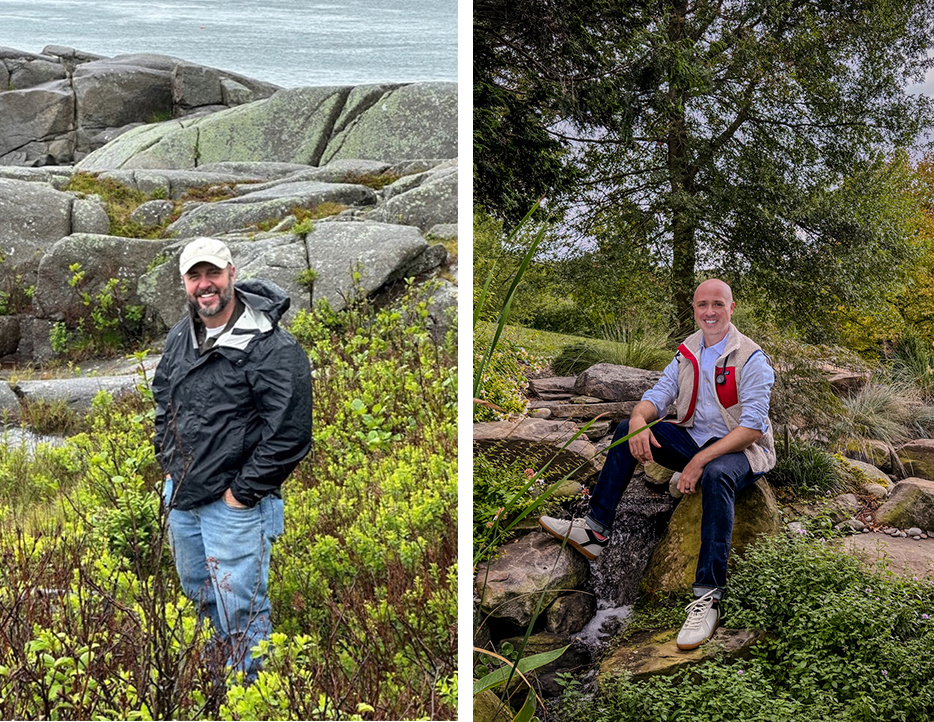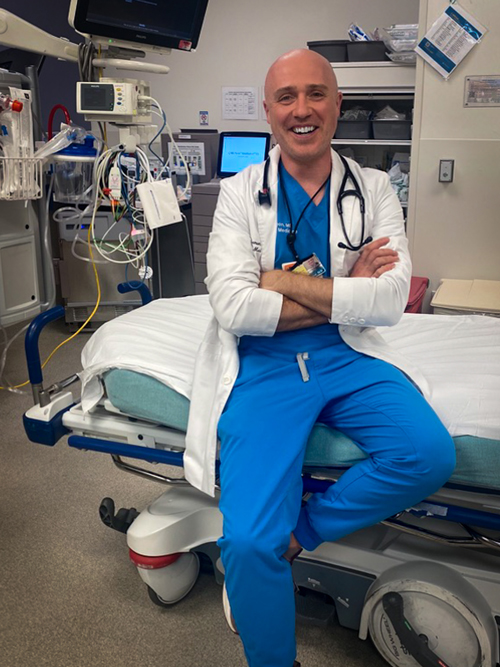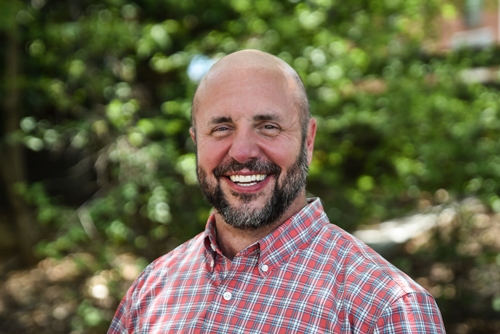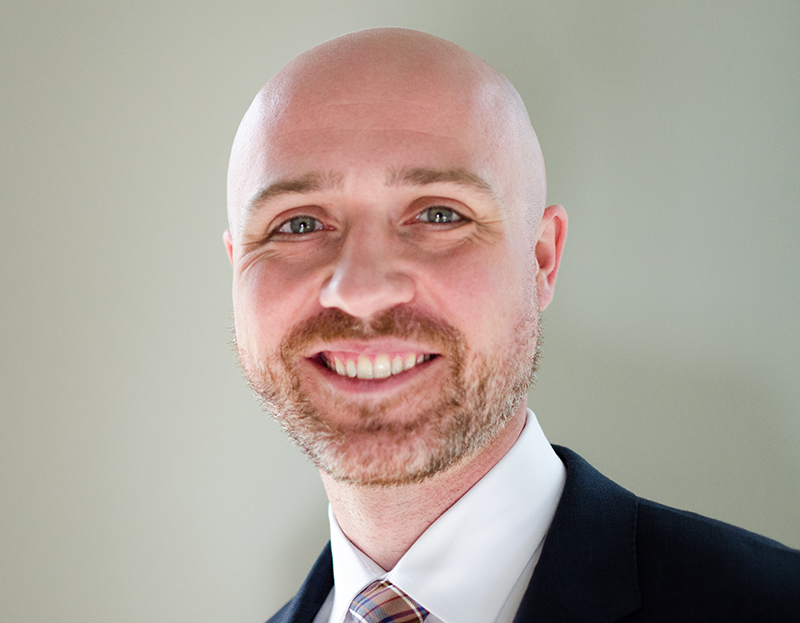After another summer of sweltering heat, extreme flooding, and in several places, unprecedented forest fires, we’re thinking even more about climate change and about the nexus of climate change and health. In Season 8, Episode 1, host Sarah Thorne and Jeff King, National Lead of the Engineering With Nature (EWN) Program, US Army Corps of Engineers (USACE), are joined by Dr. Christopher Lemon, a physician and Assistant Professor, Department of Emergency Medicine, at Johns Hopkins Medicine; Faculty Codirector of Clinical Programs with the Institute for Planetary Health; and Fellow with the Bloomberg American Health Initiative at the Johns Hopkins Bloomberg School of Public Health. Experts project that over 3 billion people are already vulnerable to the impacts of climate change. Chris is using what he calls his “superpowers” to assess how climate change is affecting people’s health around the world and take action. He’s passionate about making a difference in his community and across the planet.
Chris and Jeff met at a conference at the US Fish and Wildlife Service’s National Conservation Training Center (NCTC) where Chris gave a presentation on Climate Change and Global Health. As Jeff describes, Chris’ presentation had a big impact: “You inspired so many people during that conference. You created so much optimism in terms of potential climate adaptation outcomes. I’m just thrilled that you came to our podcast to share your message with our listeners.”
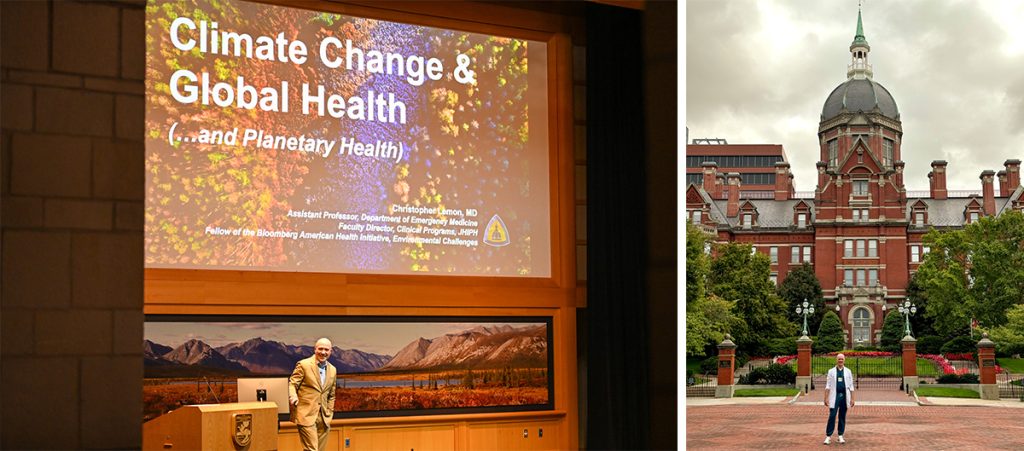
For Chris, the conference was an opportunity to get in front of an audience with different backgrounds but a common interest. “When you have those intersections of expertise, the magic really starts to happen. In one of the working groups, we started to pick up on the mental or physical health implications of some of the EWN projects at military installations. Pretty quickly it became this great synergy of how I bring certain things to the table as part of these complex solutions that we need to engineer.” Jeff agrees and notes the magnitude of the opportunity. “These military installations are a wonderful opportunity—across 25 million acres of land—to do something positive for the employees at the installations, the military personnel, and the communities adjacent to military installations. They all can benefit from this interaction with nature.”
We asked Chris to describe his journey into the nexus of climate change and public health. Chris “grew up in nature” and planned to pursue environmental studies. Through his experience on a student trip to Ghana, his focus changed to medicine and public health. “I’m on this nonlinear track, veering left and right, but it just became very obvious to me that there was this potential that there are multiple ways to be involved in bigger solutions from a healthcare vantage point.” He ended up specializing in emergency medicine and pediatrics as “the biggest macro breadth of experience I could bring to these ideas.” Being in a community emergency department provides a unique opportunity. “It’s one thing to be in an academic situation with certain resources available to you, talking about what we need to do. It’s another thing to actually be on the ground in the community, working with neighbors, figuring out what their perspectives are.”
As a frontline physician, the COVID-19 pandemic had a profound effect on Chris’s journey. “You have to overcome all these challenges during the pandemic and the bumps and bruises along the way. I think what I came out with were learning experiences that kept me thinking about the complexity of problems we have and the best way I can help.” He adds, “as a healthcare provider, you’re often there for people, holding their hand at the best times and at the worst times. Their stories are so impactful—they change the way you think about the world.” Chris describes the pandemic as a “dress rehearsal” for what the impacts of climate change will be on society. “Initially, everybody came together and was supportive of the healthcare sector. And then as time and stress continued to erode things, we saw misinformation, disinformation, and a breakdown in trust of healthcare voices. I just kept thinking to myself, as climate change worsens, we’re going to see what we are seeing right now.”
Chris compares his experiences in healthcare to the engineering and EWN context. In both, the “traditional” approach has often been to try to control nature to an ever-increasing degree. “The things I’m seeing in healthcare right now, especially at Johns Hopkins, around what we can do for people in terms of identifying concerning proteins as blood markers or curing types of cancers by weaponizing our own immune systems against them, are amazing. We have the power that we have to do this. But there’s still this mantra of, ‘first, do no harm.’ That’s been around for a long, long time, much longer than our more recent industrial revolution and the use of fossil fuels. Right now, US healthcare contributes roughly 8.5 percent of US emissions. So, we are ‘doing no harm’ with the goal of making people healthy; and yet, ironically, because we’re not working within the constructs of nature anymore, we’re actually making people unhealthy.”
It is this more macro view of climate change and public health that Chris is trying to address at the Johns Hopkins Institute for Planetary Health. “Planetary health is basically a transdisciplinary field. It’s solutions oriented, and also a social movement. It focuses on analyzing and addressing the impacts of human disruptions on Earth’s natural systems. But importantly, those disruptions have impacts on human health and all life on Earth. We are bringing that into the center of the conversation—that our well-being and health, as well as all other living creatures on Earth, need to be the focus of how we understand these impacts that we’re creating.”
Chris’s story resonates with Jeff and what he is seeing and striving for in the EWN community: “Chris, I admire the energy and enthusiasm with which you approach the challenge of planetary health. It’s quite evident that you have so much knowledge to share, as well as the energy to make change a reality. Your interaction with others across organizational sectors with different disciplines brings a new focus on these challenges—you bring a critical piece of the puzzle that makes a difference.”
Jeff and Sarah invited Chris back to talk more about the important work being done by the Planetary Health Alliance, a growing consortium of over 450 universities, nongovernmental organizations, research institutes, and government entities from 75+ countries around the world who are committed to understanding and addressing the impacts of global environmental change on human health and wellbeing. Our conversation with Chris continues in Episode 2 on October 9. We hope you enjoy these special episodes!
